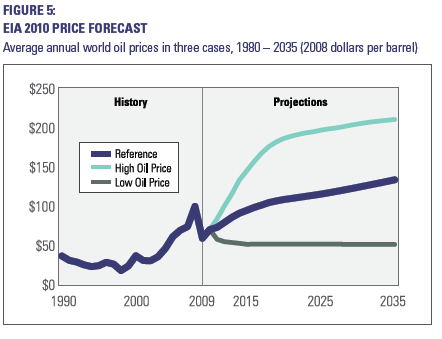It is also important to reflect on the pricing environments that were predicted years ago when these optimistic forecasts were made.
Above are charts of the EIA’s 2002 and 2010 oil price predictions. Over the last eight years its high case future price prediction has increased by over 600% from the low $30s to north of $200, while the median reference price has gone from below $30 to almost $150 by 2035. Reflecting on these historical price forecasts really puts into perspective the amount that production growth has disappointed. Had the oil price stayed in the EIA’s 2002 predicted price range, global production would have significantly declined. In fact, all of the production growth we have experienced since then can essentially be attributed to high cost oil operations which are economically dependent on very high oil prices.
We highlight the magnitude of these forecast errors not to criticize their sources but to emphasize how terribly unprepared we are to deal with an oil production-constrained world. Economic growth is well correlated with oil consumption as increasing global GDP requires increased energy use that is heavily oil dependent. Conversely, if oil supply is limited or declines, real economic growth tends to stagnate, if not decline, in lockstep. If a country begins to lose its access to affordable energy its economy will likely shrink.
Why are Prices High? – No More Giants
There are a number of reasons why there has been so little growth in supply. First, and most importantly, global supply is struggling to grow because we are not finding and bringing into production any new “super giant” oilfields. This reality was well documented by the EIA in a study it published in 2008.3
The EIA study revealed that the largest 1% of oilfields (798 total fields) in the world account for over 50% of global production. Remarkably, in this group, there are 20 super giant fields which account for roughly 25% of global production. All of these super giant fields were discovered decades ago.














